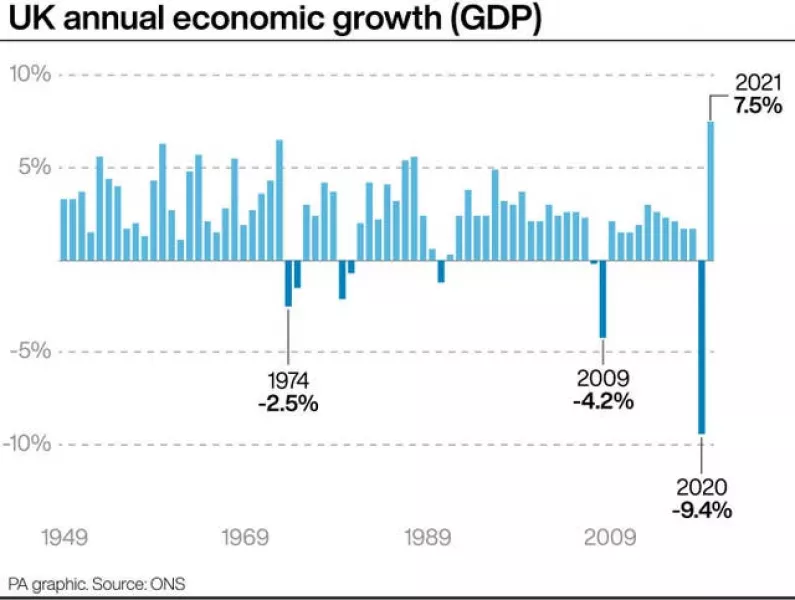The UK economy soared by record levels in 2021 as gross domestic product (GDP) rebounded by 7.5 per cent, according to official figures.
The growth, which exceeded projections by the Bank of England, was the fastest since ONS records began in 1948 but nevertheless came after a record 9.4 per cent slump in the economy in 2020.
New data from the UK's Office for National Statistics (ONS) also showed that the economy grew by one per cent in the final three months of the year, despite the impact of the spread of the Omicron variant of Covid-19.
The economy contracted by 0.2 per cent in December as the hospitality and leisure sector felt the brunt of Omicron and related government restrictions.

However, the economy remained at pre-pandemic levels from February 2020
ONS director of economic statistics Darren Morgan said: “GDP fell back slightly in December as the Omicron wave hit, with retail and hospitality seeing the biggest impacts.
“However, these were partially offset by increases in the Test and Trace service and vaccination programmes.
“Despite December’s setback, GDP grew robustly across the fourth quarter as a whole, with the NHS, couriers and employment agencies all helping to support the economy.”
Mr Morgan added that although GDP in December was in line with levels from February 2020, the fourth quarter as a whole was “slightly below” the same period in 2019, before the pandemic struck.

The ONS said the services sector grew by 1.2 per cent over the latest quarter and is now 0.5 per cent bigger than before the pandemic, although this area reportedly declined in December.
The latest figures also highlighted that production output fell by 0.4 per cent for the quarter.
Chancellor of the Exchequer Rishi Sunak said: “Thanks to our £400 billion package of support and making the right calls at the right time, the economy has been remarkably resilient; with the UK seeing the fastest growth in the G7 last year and GDP remaining at pre-pandemic levels in December.
“I’m proud of the resolve the whole country has demonstrated, and proud of our incredible vaccine programme which has allowed the economy to stay open.
“We’re continuing to help the economy rebuild through our Plan for Jobs, boost for business investment and support for households with the cost of living.”
However, Samuel Tombs, chief UK economist at Pantheon Macroeconomics, said: “The UK economy’s performance continues to underwhelm relative to its peers in the G7.
“Q4 GDP was 0.4 per cent below its Q4 2019 level, whereas it already was 3.1 per cent above its pre-Covid peak in the US, 0.9 per cent above in France and 0.2 per cent above in Canada.”
Thomas Pugh, economist at RSM UK, added: “We expect all of the output lost during December and January to be regained in February and March, meaning that Omicron should not have had a lasting impact on the economy.
“However, the rebound may be relatively short-lived as inflation will continue to rocket in the coming months, peaking at around 7 per cent in April.
“Inflation and tax rises mean households’ real incomes will fall by the largest amount in three decades in 2022, which will put a big dampener on their confidence and their ability to go out and spend.”







